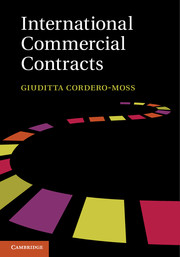Book contents
- Frontmatter
- Contents
- Preface
- Introduction
- 1 Contract practice and its expectations in terms of the governing law
- 2 The role of transnational law
- 3 The impact of the governing law
- 4 Which state law governs an international contract?
- 5 Does arbitration ensure a self-sufficient contract?
- 6 Conclusion
- Bibliography
- Index
Preface
Published online by Cambridge University Press: 05 June 2014
- Frontmatter
- Contents
- Preface
- Introduction
- 1 Contract practice and its expectations in terms of the governing law
- 2 The role of transnational law
- 3 The impact of the governing law
- 4 Which state law governs an international contract?
- 5 Does arbitration ensure a self-sufficient contract?
- 6 Conclusion
- Bibliography
- Index
Summary
This is the book that I would have liked to have read when I started my career as an in-house lawyer in an Italian multinational company about thirty years ago. Working with international contracts, I soon started wondering about various aspects of contract drafting. Why are international contracts written in a style that is completely different from their domestic counterparts and why are they written in the same style irrespective of the law that governs them? Is there some sort of transnational law that allows for the governing law to be disregarded and requires that contracts be written in a certain way, independently of the jurisdiction in which they will be implemented? Is national law made redundant by the extremely detailed style of the contracts? Does the choice-of-law clause written in the contract mean that the parties may exclude the applicability of any other rules from any other laws? Does the arbitration clause written in the contract mean that the parties may rely fully on the terms of the contract and the choice of law made therein, and need not be concerned with any other sources?
These questions continued presenting themselves after I went over to a Norwegian multinational company, and became even more pressing when I started following this company’s legal interests in what was soon to become the former Soviet Union.
- Type
- Chapter
- Information
- International Commercial ContractsApplicable Sources and Enforceability, pp. xiii - xviPublisher: Cambridge University PressPrint publication year: 2014



